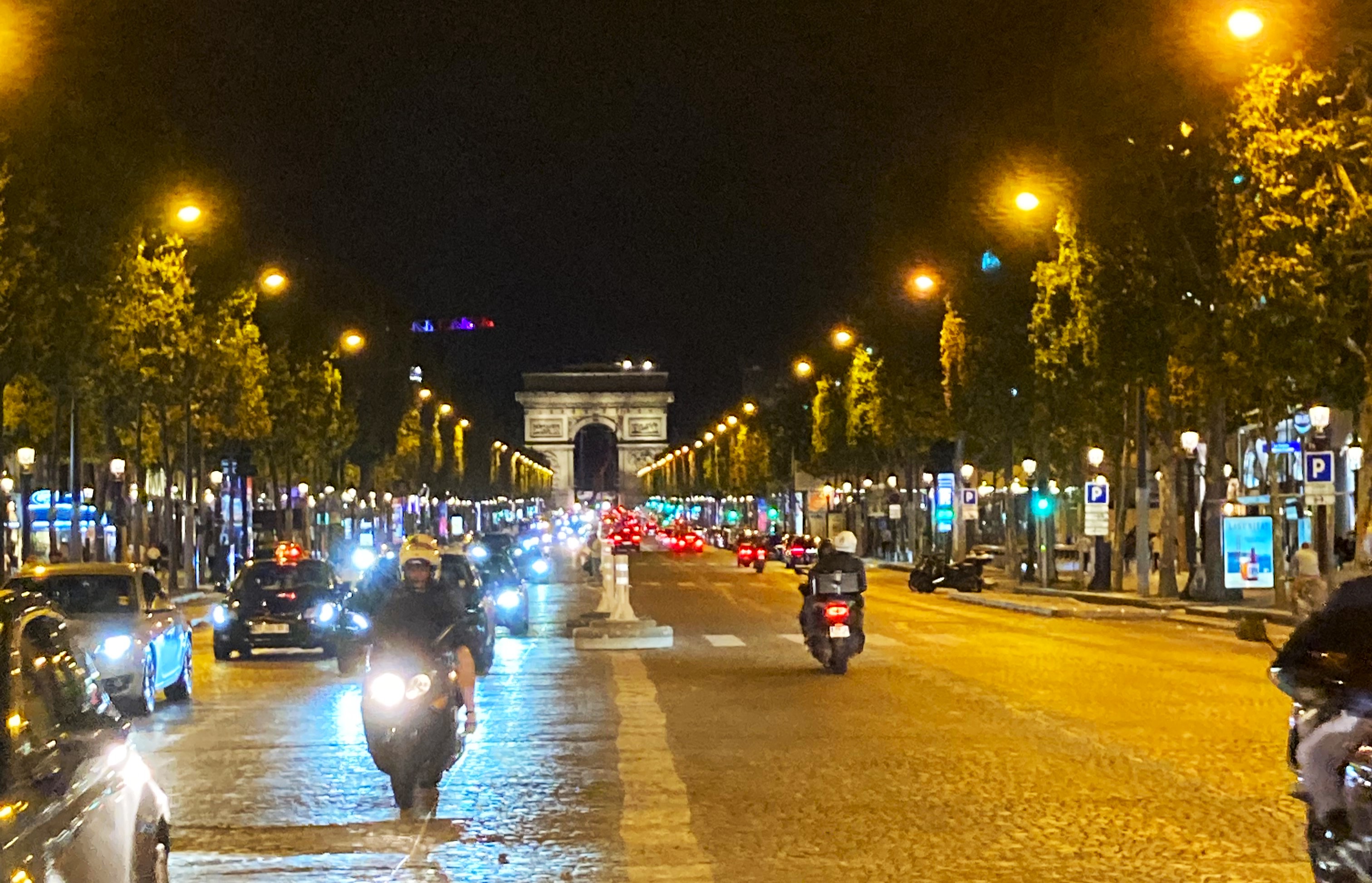I Didn't Hear Paris

Paris is one of the noisiest cities in Europe, and it is particularly concentrated in the 7th, 17th, and 18th arrondissements. There is always street noise, the wide avenues accommodating many cars and trucks, and the ever-annoying and plentiful motorcycles. When riding the Metro, one is constantly inundated by the shrieking and creaking of the train on the rails. The sirens of emergency vehicles seem to be always ringing (and I've always found European sirens considerably louder than American ones). The noise can be overwhelming. Especially now, with the city scrambling to accommodate millions of visitors for the 2024 Summer Olympics, there is always the constant clamor of construction that only abates with nightfall. But when night does fall, people leave their homes and head out into the cafés, filling the void with their voices. The noise pollution in Paris is so bad that the city has taken concrete steps to try to reduce it by installing noise meters throughout the city to pinpoint where noise hits hardest, whose reports are detailed in a map produced by the Paris local government. Indeed, the noise often passes the level considered healthy.
Constant exposure to such noise is proven to have adverse effects on both mental and physical health. In a report published by the World Health Organization (WHO) in 2018, different limits were set for different kinds of noise at different times of day. In the daytime, the WHO recommends that exposure to road noise not surpass 53 decibels, 45 at night; similar to the sound of a household refrigerator. The same report demonstrated that over-exposure to both street noise and leisure noise, including the music in your headphones, led to increased levels of general annoyance, sleep deprivation, hearing impairment, tinnitus and even heart disease. For leisure noise among the youth, studies have shown that more than four hours of exposure a week to headphone noise was enough to cause hearing damage.
Source: Environmental Noise Guidelines for the European Region. World Health Organization, 2018.
When the constant noise of Paris is combined with the stand-offish nature of urban people, and people's natural affinity for their own music, many people choose to don headphones rather than take in the noise of the city, even with the adverse effects. Rarely will one see a Parisian resident walking freely alone without some kind of listening device in their ears. This is certainly the case with younger people, who even opt for over-ear noise canceling headphones to completely drown out the noise of the people around them, preferring to lose themselves in a sea of their podcasts or music. It is so common among youth that it has become a sort of meme about people who are afraid to be alone with their own thoughts and, thus, require constant stimulation.
I, myself, am guilty of doing just this. I frequently take walks at night as a means of clearing my head and decompressing. And like most people, to try and avoid being interacted with, I put in my earbuds and have music or a podcast playing in the background. Since I use these walks as a way to ruminate and arrange my affairs, sometimes I wind up stressing myself out on walks that are supposed to do the exact opposite. The music constantly droning in my head does nothing to diminish this stress, but I still refuse to take out my headphones. While occasions like this are rare, they do arrive, and it is in those moments I realize just how noisy an existence I lead. Even after I notice the music I am playing is actually doing more harm than help, I still cling to it as a means of "calming me down."
But on one of these late-night walks, I realized another thing brought on by my doing this: I simply do not hear Paris.
Paris is a great place to stimulate your senses. It is visually beautiful; its architecture and greenery are counted among the most beautiful in the entire world. Its taste comes through French cuisine, again considered among the best in the world. Its smell and feel vary depending on where you are, of course. A metro station does not smell nearly as nice as the Jardin du Luxembourg, just as the feel of a dirtied and possibly diseased seat on the bus does not feel as nice as a champagne intoxication in Trocadero.
But hearing? That is something that I cannot describe, because I cannot claim to having heard Paris. To me, Paris sounds like a song or the inane ramblings of whatever voice is speaking to me through my headphones. Even when I cannot find something particularly interesting to listen to, or even do not particularly want to listen to anything at all, I still do. Of course, there have been times when I have forgotten my headphones, or when the noise got overwhelming enough for me to remove them, but I still cannot say I really "heard" the sound of Paris. Perhaps Paris does not sound like anything in particular at all.
And besides, on those days when I would hear Paris, I certainly did not like what I heard. Having been brought up in a rural area, where I heard the sounds of birds and roosters and the rustling of trees with the wind, I am quite ill accustomed to people constantly talking and sirens and street noise (especially motorcycles, whose noise actually succeeds in annoying me each time I hear it). I guess I'd prefer to hear sounds I like hearing, overwhelming as they are, than sounds I do not want to hear at all.

Metros are often crowded, stuffed with people who are not always silent. Image credit: Bettina Levente
My peers are in similar positions. Collectively, after asking a few of them about this issue, they all appeared perplexed, as if they had not thought about the issue. Much like me before, putting in music and shutting out the world was either logical, (who doesn't like to listen to music, especially on the metro?) or it was a necessity, as some people could not handle to overstimulation of the constant noise. When I brought up the fact that they might be missing out on something, that was never a possibility that occurred to them, but one that intrigued them when brought up.
Shutting out the wider world is actually part of a problem of eliminating organic, if man-made, noise. I want to silence the noise around me, so I replace it with noise that is supposed to be more appealing, i.e. music or podcasts. But that still means the constant presence of noise. It seems that, in Paris, we do not have a choice. In choosing one side, we neglect something else, and we can never escape sound. No matter where we turn, we have no choice but to go crazy. It is frustrating for me, and for others, to never be able to fully enjoy the peace and quiet with which so many of us grew up. So today, I think it's time to make a change. Part of living in an environment is you are supposed to experience something fully, through all of your senses. While the constant chatter and sirens may be harsher on the ear, a constant droning in my ears is beginning to become less and less a source of peace. I think it is time I choose to hear Paris.





